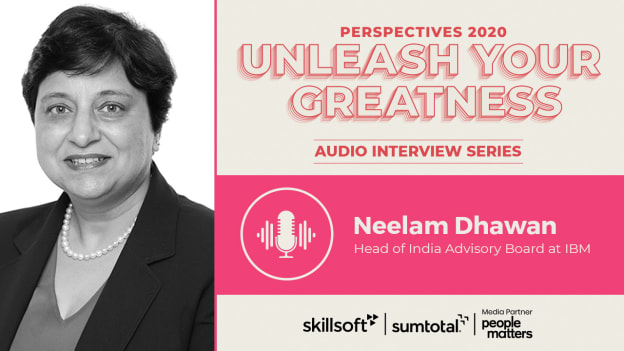Business Leader Neelam Dhawan on the impact of the current global crisis on people & work

Michelle: Amid this time of crisis, what is the one thing you are grateful for?
Neelam: I am grateful for technology!
And so is almost everyone. Amidst this one of a kind global crisis, technology is the binding factor that is helping people stay connected, enabling businesses and governments to deliver, and professionals all over the world to be productive, be engaged and continue learning even in these tough times. It is in this direction, on 13th May 2020, learning and talent professionals, business leaders, and learners from across the globe will get an interesting chance to explore critical issues, immerse in best practices, and stream live with the world’s brightest at Perspectives 2020. To ensure a one-of-a-kind digital experience, Perspectives 2020 has an awesome line-up of speakers including some of the world’s most influential technology leaders, thought leaders, and CEOs from all over the world. One such speaker is Neelam Dhawan, Head of India Advisory Board at IBM who is also a Board member at Royal Philips, Netherlands, ICICI Bank Limited India and Yatra Online Inc.
After helping many companies in their transformation journey for years, Neelam continues to assist and advise businesses as the pandemic shakes up the world of work and arm-twists all the leaders to relook at their business and people strategies. She shares some insights from her conversations with business leaders from diverse sectors and talks about the new future of work, in a recent podcast hosted by Michelle Boockoff-Bajdek, Chief Marketing Officer at Skillsoft.
Here are some key takeaways from the special podcast hosted a few weeks before Perspectives 2020:
Catching up with the pace of change
Neelam highlighted how discussions and decisions taken in the first week of March in many board meetings had to suddenly be relooked at as the situation in the market kept on changing. In the initial phase the top priority for businesses was to help the community at large and the society in dealing with the pandemic. Whether it was paying donations or supporting the research groups with necessary technologies, many businesses stepped up and contributed to the society to help fight the health crisis. Then the second focus was ensuring employees’ well-being, which is why many companies asked their employees to work from home, even before the lockdown was announced.
But no one was really prepared for what was coming. “Towards the end of March, the narrative and conversation changed. The business leaders realized that the lockdown is not for a week, ten days, but it may extend to a couple of months. Taking the example of China, where it took nearly four months before Wuhan could open, they realized the approach has to change,” said Neelam.
So, from the end March to the first week of April, businesses shifted priorities to the longer-term survival of business.
Do we have the cash to survive?
The most pressing question all business leaders across sectors are grappling with is: Do we have the cash to survive?
The challenge is as Neelam highlights, “They want to do the right thing for the business, the right thing for the employees, and they must have cash to make it happen.”
So now a key focus for most leaders is to figure out how they re-allocate the money and adjust their performance forecast for 2020. Neelam suggests that cash is better to be in hand and we need to conserve cash and then look at planning the rest of the year.
href="https://www.skillsoft.com/perspectives/?psrc=peoplematters&utm_source=content">Perspectives 2020.
Adopting the new ways of work
Besides ensuring business continuity the next big challenge for leaders is to help all employees adopt and settle in the new mode of working. Now for some, Neelam says it was easier to move into a work from home setup. Some companies already had systems for it in place, had secure firewalls and the necessary technology and equipment. But there are others who were not familiar with work from home. In fact, for some sectors and some functions, working from home is not really an option.
The others are slowly adjusting to the new normal and revamping their approach towards work.
“Leaders and all employees together are finding their learnings, how to do conference calls, video calls, and live chats,” said Neelam.
But one of the key realizations has been that working from home can get lonely and also lead to longer hours of work.
“It is difficult to learn the discipline of being productive while working from home!” exclaims Neelam.
The perception that you are always available because you are working from home is putting stress on the teams. Neelam has a solution for this problem. In the morning team leaders and managers should have an early morning call with their teams to set the priorities for the day, align and hear their concerns. And then give them the space to carry on with their work and most importantly allow them to draw the line between life and work for odd hours and weekends, especially.
Adopting the new way of working amid this global health crisis requires a huge cultural shift that has to be inculcated while working virtually. Every message, every call, every conversation becomes all the more critical.
The new future of work & its impact on skilling
The future of work is not a new term. It has been widely discussed among professionals across the globe. But the pandemic has perhaps changed its meaning forever.
The future of work is going to be very digital and more people will adopt technology, shared Neelam.
The manufacturing sector will also move to IoT and other shop floors, the use of robotics will increase. Further a whole lot of analytics will be used to take decisions. The picture that Neelam paints is that a worker of a shop floor will also be using IoT. This means that each worker will have to be digitally aware to fit the role and do the task efficiently.
Professionals like doctors and lawyers would also be required to have a working knowledge of technology and analytics otherwise their efficiency will be compromised.
“The future of work will depend so much on technology. Every other job is going to be touched by digital,” said Neelam.
So, the focus of skilling has to be on AI, IoT, Robotics, Process automation and blockchain.
Neelam will talk more about the people challenges businesses are facing in this time of crisis, ensuring business continuity and the aftermath of the global crisis at Perspectives 2020. Click here to register and to learn more from her and other industry stalwarts and leading experts, as well as to explore and enhance those critical skills we know will be essential for the future.
Come for inspiration, leave with the ideas to action!


















